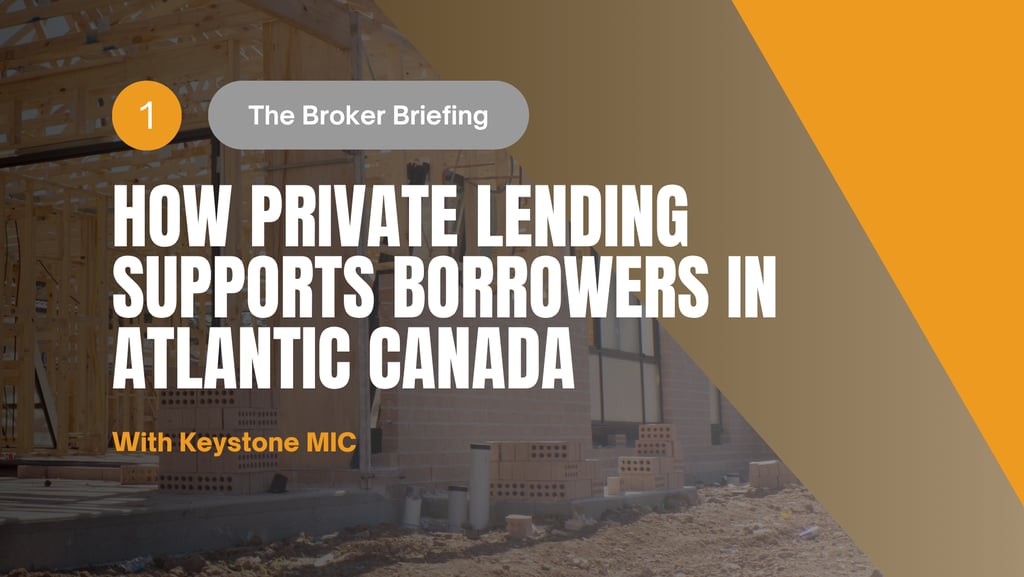How Private Lending & MICs Like Keystone Support Borrowers in Atlantic Canada | ① The Broker Briefing
Private lending is an increasingly important tool for mortgage brokers. In this post, we explore the ins and outs of private lending through Mortgage Investment Corporations (MICs) and share insights from our recent session with Keystone MIC. Learn why a private mortgage might be the key to getting a tricky deal across the finish line.
THE BROKER BRIEFING
6/9/20254 min read


How Private Lending & MICs Like Keystone Support Borrowers in Atlantic Canada
In our line of work, we know that not every deal fits neatly inside a box. While traditional lenders continue to be the backbone of mortgage brokering, private lending — especially through Mortgage Investment Corporations (MICs) — is playing an increasingly important role in getting deals across the finish line.
At Mortgage Alliance - United Group, we’re big believers in giving our brokers the tools, knowledge, and confidence to serve every kind of borrower. That’s why we host regular learning sessions with lenders like Ryan MacNeil at Keystone MIC, who recently joined us to walk through how their private lending works — and where it fits best. Their motto: Fast Commitments. Fast Fundings. Unparalleled Service.
This post is for fellow brokers, agents, and mortgage professionals who want to understand how MICs can help you say “yes” to more clients.
What is a Mortgage Investment Corporation (MIC)?
While traditional lenders work well for many, they sometimes have rigid criteria that leave certain borrowers without the options they need. That’s where MICs — and lenders like Keystone — shine. Typically, MIC clients include:
Real Estate Investors & Builders:
"Fix and Flip" Enthusiasts: For those that need quick capital to purchase, renovate, and sell. Private loans are ideal for short-term, high-value projects.
New Construction & Development: Early-stage financing, like for foundations, or reaching 97% occupancy can be harder to secure with traditional lenders. Private lenders offer short-term capital to kick-start builds, helping increase housing inventory in Atlantic Canada.
Homeowners in Transition of Financial Flux:
Life happens. Whether it's job loss, separation, or debt overload, private mortgages can provide breathing room to consolidate, stabilize, and eventually return to conventional lending.
Self-Employed & Non-Traditional Income Earners:
Clients who are asset-rich but light on paperwork still deserve access to capital. MICs often assess risk more flexibly. Though we didn’t dive deep into this at the Keystone session, it’s worth noting because we’ve encountered it many times and train on it regularly.
The Keystone Advantage: Why Brokers Should Understand the Private Option
Our conversation with Ryan MacNeil Keystone highlighted several compelling reasons why their solutions stand out:
Speed: In today's fast-paced market, getting a mortgage approved and funded quickly can be the difference-maker. Private lenders like Keystone can close in days, not weeks, giving you a significant competitive edge.
Flexible Underwriting & Minimal Documentation: Keystone emphasizes a more agile approach to documentation. While proof of income and appraisals are still required, their methods for obtaining valuations can be more efficient than traditional lenders. For instance, when a client purchases multiple properties, an appraisal for only the highest equity property may suffice. They can also leverage desktop appraisals on certain properties, utilizing publicly available data and online resources to estimate value, accelerating the process.
Open Terms: Unlike many traditional mortgages, private loans often offer open terms, meaning you can repay the loan at any time without incurring hefty penalties. This is fantastic for short-term needs or bridging finance.
Focus on Atlantic Canada: Keystone is deeply committed to our region, understanding the unique real estate landscape of Nova Scotia and Atlantic Canada. While they're licensed in other provinces like Ontario, their focus remains here, offering tailored solutions for our local market.
Solving the "Bank Says No" Dilemma: Perhaps the biggest benefit of all is the ability to secure financing when traditional institutions cannot or will not. Private lenders remove barriers, allowing projects to proceed and individuals to manage challenging situations.
It’s important to note that most MICs want clients to be in private lending for a short-term, specific goal and have an exit strategy to move to traditional lending.
But What About the Rates?
One of the most frequent questions surrounding private lending revolves around interest rates. Private lending rates are higher — we all know that. But it’s about value, not just the number.
It's essential for us as brokers to articulate why these rates are structured differently and, more importantly, to demonstrate the value clients receive for this premium. This isn't just about a higher percentage; it's about the effective cost of capital and the specific problem it solves.
Understanding the Cost of Flexibility:
Higher Rates for Specific Needs: These rates reflect the increased risk, speed, and flexibility that private lenders like Keystone provide. They cater to scenarios where traditional banks say "no," or where time is of the essence, offering a lifeline that otherwise wouldn't exist.
Short-Term Solutions: Private mortgages are often short-term bridges, not long-term solutions. They are designed to get a client from Point A to Point B — whether that's completing a renovation, stabilizing finances, or securing a property quickly — before transitioning to a more conventional mortgage. The higher rate is for a limited duration, making the overall cost impact often less significant than it first appears.
Interest on Utilized Funds Only: Crucially, many private lending structures, especially for construction or investment lines of credit, are based on interest paid only on the funds actually drawn down by the borrower, not the entire approved loan amount. This is a vital distinction to explain to clients. For example, if a builder has a $500,000 private facility but only uses $100,000 for the first phase of construction, they only pay interest on that $100,000. This significantly reduces the cost of borrowing for short-term capital.
Is a MIC Mortgage Right for Your Client?
Private lending isn’t for every client, and it usually won’t be your first stop. But when traditional financing falls short, MICs like Keystone offer a regulated, responsive, and relationship-driven alternative. If you’re a broker in Atlantic Canada and want to chat more about when private lending makes sense — or connect with a lender like Keystone MIC — let’s talk.
We’re always learning, and we’re happy to share what we know. Don’t forget to check out Keystone’s Podcast: Canadian Private Lenders’ on Spotify.
Contact Us
info@umgatlantic.ca
902.536.3655
© 2025. All rights reserved.
Original design by Vyper.Media


Leave a Review
Had a great experience? We'd love to hear about it!
294 Cobequid Road
Suite 21
Lower Sackville, NS
B4C 4C5
LIC. 3000164
"United" Mortgage Alliance is a team operating under Mortgage Alliance (LIC. 3000164). Any self-reference refers to "United" Mortgage Alliance, with mortgage services in Nova Scotia provided through Mortgage Alliance. For clients in other provinces, services are delivered via referral or co-broker arrangements with a Mortgage Alliance broker or entity.
Subscribe to our newsletter
Get local market insights, mortgage rate updates, community news and more. We promise no spam — just a few valuable messages each month.
